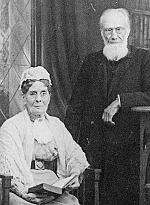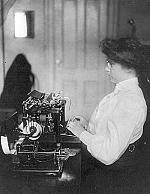Baffled to Fight Better

[Above: John Lavery, Wounded, London Hospital, 1915. Oil on canvas—Dundee Art Galleries and Museums / Bridgeman Images]
During the spring of 1917, Chambers spoke nightly on the book of Job at classes in Zeitoun. He recognized Job’s power to speak to soldiers after his own personal study:
I feel growingly sure that Job is the book of consolation for the sorrow-tossed and bereaved and broken by the war, for not only is the voice of human suffering expressed here better than anywhere, but the very breath is drawn in fear of the Lord, and the heart is strong in the hope that grades higher than faith.
Biddy compiled these talks into a book, Baffled to Fight Better (now titled Our Ultimate Refuge). Here are a few excerpts.
THE UNSEEN UNIVERSE (Job 1:1–12)
Today there is in our midst a crop of juvenile sceptics, men who up to the time of the war had had no tension in their lives, and as soon as turmoil embroiled them they flung over their faith and became cheap and easy sceptics. The man who knows that there are problems and difficulties in life is not so easily moved. Most of us get touchy with God and desert Him when He does not back up our creed (cf. John 6:60, 66). Many a man through this war has lost his form of belief in God and imagines that he has thereby lost God, whereas he is in the throes of a conflict which ought to give birth to a realisation of God more fundamental than any statement of belief. . . .
God never once makes His way clear to Job. Job struggles with problem after problem, and Providence brings more problems all the time, and in the end Job says, “. . . now mine eye seeth Thee.” He saw that all he had hung in to in the darkness was true, and that God was all he had believed Him to be, loving and just and honourable. . . .
Will I trust the revelation given of God by Jesus Christ when everything in my personal experience flatly contradicts it?
DAZED AND AMAZED (Job 1:13–2:13)
Satan had been allowed to attack Job’s possessions; now his power is increased, and he is free to attack Job’s personal inheritance direct. When a man is hit by undeserved destruction, the immediate result is a slander against God—“Why should God allow this thing to happen?”
There are people today who are going through an onslaught of destruction that paralyses all our platitudes and preaching; the only thing that will bring relief is the consolations of Christ. It is a good thing to feel our own powerlessness in the face of destruction, it makes us know how much we depend upon God. In these days the outstanding marvel is the way mothers and wives have gone through sorrow, not callously, but with an extraordinary sense of hopefulness. One thing the war has done is to knock on the head all such shallow optimism as telling people to “look on the bright side of things”; or that “every cloud has a silver lining”: there are some clouds that are black all through.
DE PROFUNDIS (Job 6,7)
Whether we like it or not, God will burn us in His fire until we are as pure as He is, and it is during the process that we cry, as Job did, “I wish You would leave me alone.” God is the only Being who can afford to be misunderstood; we cannot, Job could not, but God can. If we are misunderstood we “get about” the man as soon as we can. St. Augustine prayed, “O Lord, deliver me from this lust of always vindicating myself.” God never vindicates Himself, He deliberately stands aside and lets all sorts of slanders heap on Him, yet He is not in any hurry.
DISGUISE OF THE ACTUAL (JOB 42:7–17)
A man will stick to his religious categories of men until he receives a shaking up from Eternal Reality, as these men did. Eliphaz and the others maintained the conception that unless a man held to the particular shibboleth of their religious creed, he was lost. The one thing that will cause the conceit that we know men to disappear is the surgery of events, the Eternal Reality of God shaking the nonsense out of us. This has happened in many a life through the cataclysm of war, and men find they have a different and a broader way of looking at things. There is no room for veneer and pretence in camp life.
By Oswald Chambers
[Christian History originally published this article in Christian History Issue #154 in 2025]
Oswald Chambers, Baffled to Fight Better / Our Ultimate RefugeNext articles
Christian History Timeline: Oswald Chambers
In His presence: the life and work of Oswald Chambers
the editorsFrom typewriter girl to publishing powerhouse
Changes in “women’s work” led to Biddy’s “ministry of the books”
Katherine Goodwin Lindgren







